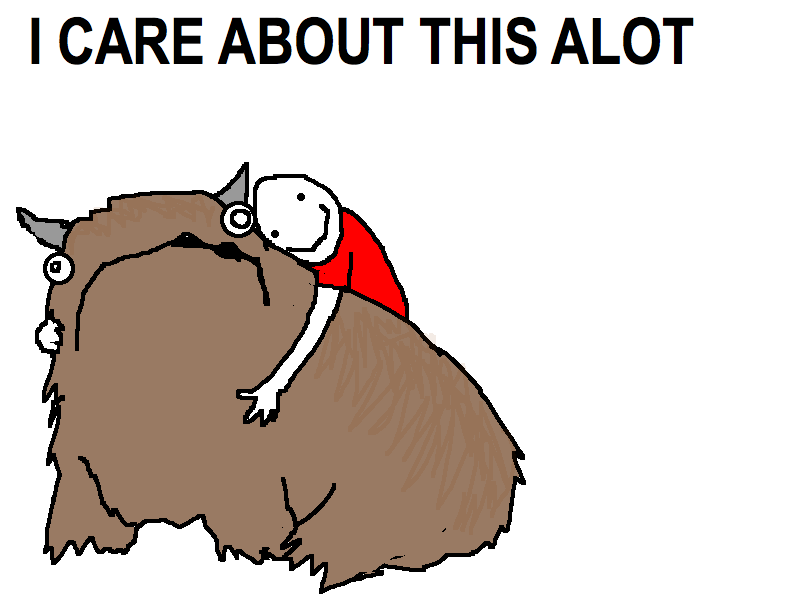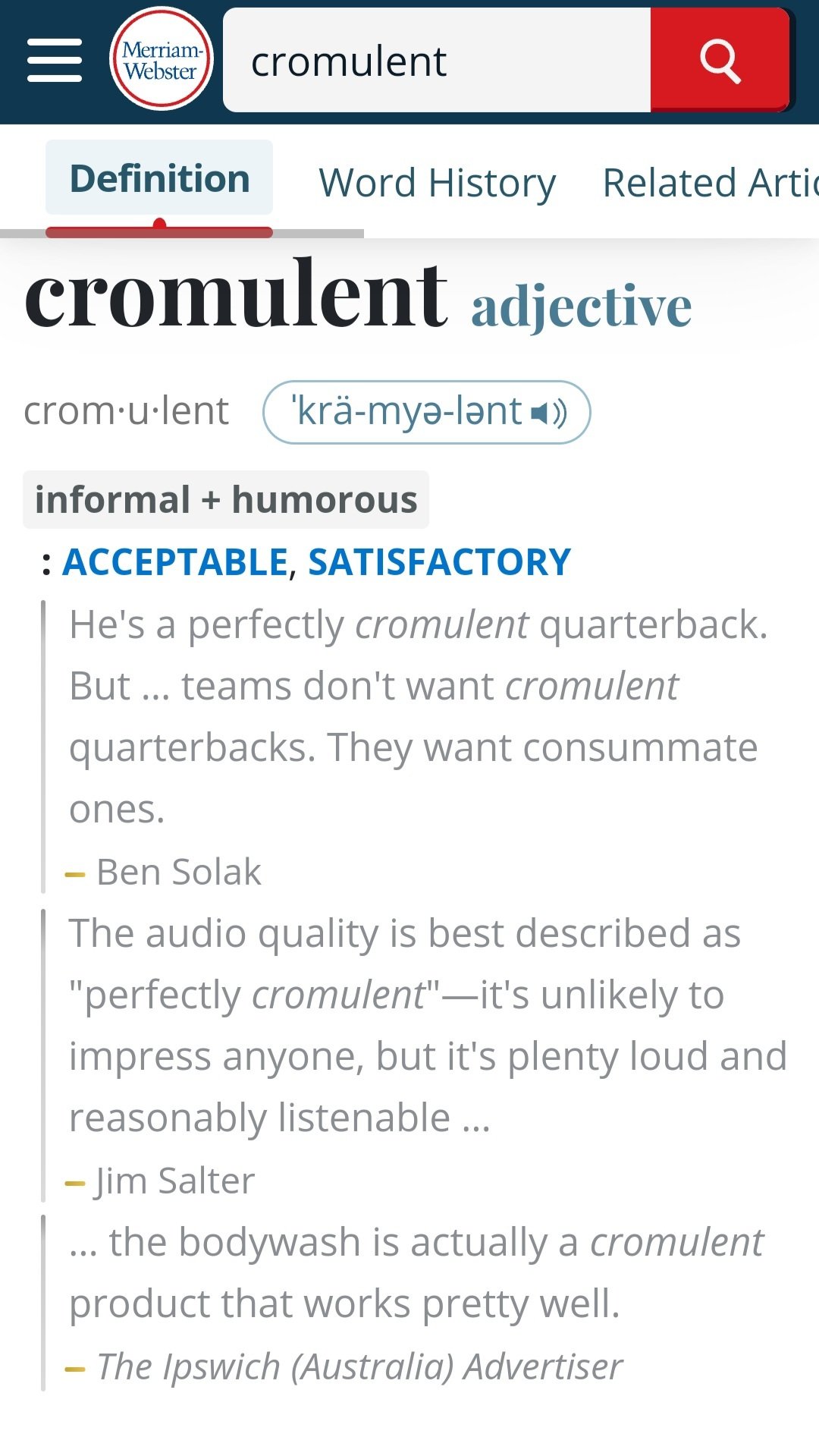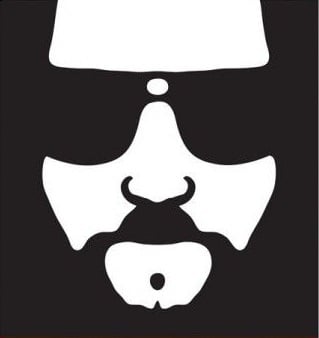I’ve always said the dictionary is a follower not a leader, by the time a word gets added to the dictionary it’s already established widespread usage
Meh, seems cromulent.
Adequately pondiferous.
The same rules apply to gods, according to Terry Pratchet
Some of the earliest religions were just trying to figure out this whole ‘words’ thing. Describing abstracts consistently was developed over time across generations, sometimes very strictly.
Gonna go on Countdown with the line “Dictionaries aren’t rule books, they’re record books” and fight Susie Dent.
deleted by creator
Try it, she’ll fuck you up with a bike chain (her weapon of choice in pub fights)
I’ve always been a big advocate of the idea that the only part of communication that matters is communication. If people understand you then congrats you’ve successfully languaged
What if people understand you, but they think you’re stupid?
Congratulations! You did the best you could…
That’s their problem. I always assume the stupid people are the ones that are so inflexible and uncreative, that they don’t understand that language is entirely an amorphous flexible human creation.
The flip side of that is that if the words you’re using are wutdownrerary, you should be told to stop using those words because by using them you make communication harder.
Does “glizzy” (e.g. hotdog) fit under this classification?
glizzy
I’ve never heard that term, and wouldn’t know what it meant.
I literally gave the definition
The problem is that people frequently use this type of argument when they are unable to spell or follow the basic rules of syntax and grammar instead of simply admitting they’re wrong.
Language does change, over time and across many cultures. It doesn’t mean that anything you write is automatically correct.
I’m a descriptivist but that doesn’t mean that there aren’t rules and that we can’t point out things still being wrong.
Descriptivism still describes rules as they’re used in the real world. Breaking those rules still subjects the speaker/writer to the consequences: being misunderstood, having the spoken or written sentence to simply be rejected or disregarded, etc.
“Colour” and “color” are both correct spellings of the word, because we are able to describe entire communities who spell things that way. “Culler” is not, because anyone who does spell it that way is immediately corrected, and their written spelling is rejected by the person who receives it. We can describe these rules of that interaction as descriptivists, and still conclude that something is wrong or incorrect.
One who culls is a culler.
“Culler” is a word, but it certainly will not be received by a reader as the same word as “color.”
True. My brain brought forward a seal clubber.
As a l33+ |><|@z0r, I’m here to criticize your command of the English language.
You just described 90% of Lemmy users.
I love militant descriptivists
And still I maintain that “alot” is not a word.
I’ve noticed a tendency of people to combine words that are frequently seen together: “alot”, “aswell”, “noone”, etc.
Some of these catch on, like “nevertheless” and “whatsoever”. Maybe eventually “alot” and “noone” will become standard English, too.
The way alot, aswell and noone are combining is expected given how many other words we don’t bat an eye at went the same way. “another” is the perfect example, it’s just “an other” combined.
It’s sort of the reverse of what happened to words like apron and newt.
The division and bracketing of phrases changes over time.
“An apron” is the modern usage of the word “napron”, and a newt was originally called an eute. The grammatical need for “a” and/or “an” resulted in the root word being rebracketed and changed.
Apart/a part is another one.
“Apart” and “a part” are opposites, though. If you’re a part of something, you can’t be apart from it.
Yes, and increasing number of people are using the former to mean latter.
I recall “noone” being taught as acceptable by my english teacher back in 2004. That being said, she’s also said some things that ended up being very wrong
I always imagine Peter Noone of Herman’s Hermits whenever someone does that.
“Noone thinks I have a lovely daughter.” Yes, Mrs. Brown. Noone does.
No body writes noone as one word because there’s a similar word written that way.
it’s all just made up. you can see old writings without spacing. or punctuation. you can’t even define what’s really a word universally. people just decided what’s what and standardized it at one point just for some consistency. that doesn’t mean things won’t change; they most definitely will.
Ampersand is another good example. “&” was considered the last letter of the alphabet for a while. Schoolchildren would recite the alphabet and finish it with the phrase “and, per se and” (“and, meaning and”).
The words got mashed together over time and the word “ampersand” was born.
“Per se” means “in itself”, so it’s a shorter way of saying “also the word ‘and’ itself”.
Frankly this wouldn’t be a problem if it weren’t for “another”

Gronk. Now bleet glanmar.

Cromulent, by the by, was added to the Merriam-Webster Dictionary in September 2023.

That said I feel like when people are referring to whether or not something “is a word” they’re referring to whether not is has seen historical/widespread usage, not “has somebody ever just decided it meant something, somewhere, at some point”
most often it’s said to dismiss people. AAVE gets a lot of that. but it’s used to mock and dismiss young people too by the “back in my day” crew.
Great post, I offer my most enthusiastic contrafribularities.
I agree, a perfectly crommulant statement from a Word Warrior.
I’m anaspeptic, phrasmotic, even compunctuous to have caused you such pericombobulation.
Once upon a time there was a lovely little sausage called Baldrick
Have you considered medial advice from a lingual artificer?
I dig the variety of topics on this comm, and I super appreciate how it doesn’t get STEMlordy at all.
It’s all connected. :)
While that’s correct and all, it still irks me when somebody uses a word that has a shorter, older variant. (Gives side-eye to orientated)
orientated
Is this common in American English? I don’t think I’ve ever seen the word oriented double handled like that. Irregardless, it slew me
Never seen it here.
“Orientated” is reasonably common in British English, I think. I remember thinking someone had misspelt it the first time I saw “oriented” written down.
ITT we fight against the evil descriptivist windmills
Skibidi rizz
This situationship is getting 🥵.















